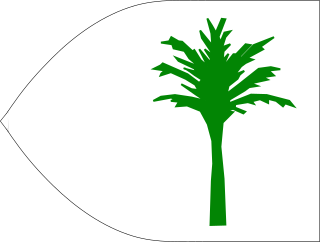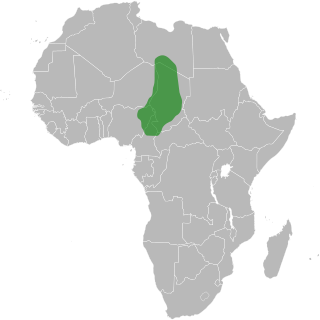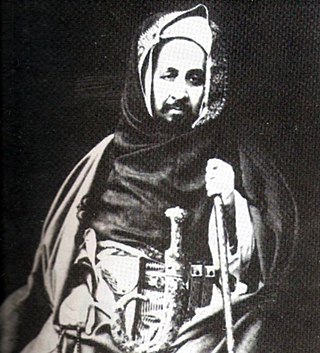Related Research Articles
Chad, officially the Republic of Chad, is a landlocked country in Central Africa. It borders Libya to the north, Sudan to the east, the Central African Republic to the south, Cameroon and Nigeria to the southwest, and Niger to the west. Due to its distance from the sea and its largely desert climate, the country is sometimes referred to as the "Dead Heart of Africa".

The Kanem–Bornu Empire existed in areas which are now part of Nigeria, Niger, Cameroon, Libya and Chad. It was known to the Arabian geographers as the Kanem Empire from the 8th century AD onward and lasted as the independent kingdom of Bornu until 1900.

The Senusiyya, Senussi or Sanusi are a Muslim political-religious Sufi order and clan in colonial Libya and the Sudan region founded in Mecca in 1837 by the Grand Sanussi, the Algerian Muhammad ibn Ali al-Sanusi. Sanusi was concerned with what he saw as both the decline of Islamic thought and spirituality and the weakening of Muslim political integrity.
Ngazargamu, Birni Ngazargamu, Birnin Gazargamu, Gazargamo or N'gazargamu, was the capital of the Bornu Empire from ca. 1460 to 1809. Situated 150 km (93 mi) west of Lake Chad in the Yobe State of modern Nigeria, the remains of the former capital city are still visible. The surrounding wall is 6.6 km (4.1 mi) long and in parts it is still up to 5 m (16 ft) high.
The Zaghawa people, also called Beri or Zakhawa, are an ethnic group primarily residing in southwestern Libya, northeastern Chad, and western Sudan, including Darfur.

The Idrisid dynasty or Idrisids were an Arab Muslim dynasty from 788 to 974, ruling most of present-day Morocco and parts of present-day western Algeria. Named after the founder, Idris I, the Idrisids were an Alid dynasty descended from Muhammad through his grandson Hasan. Their reign played an important role in the early Islamization of Morocco and also presided over an increase in Arab immigration and Arabization in major urban centers.

Sayfawa dynasty, Sefouwa, Sefawa, or Sefuwa dynasty is the name of the Muslim kings of the Kanem–Bornu Empire, centered first in Kanem in western Chad, and then, after 1380, in Borno.
Dunama Dabbalemi, or Dounama Dibbalém, Duna ma ( east) Mai Dunama Toubou Dynasty from bornu, was the Derde of the Kanem Empire, and Mai of To Tibesti, he membre Clan Toumaghara, (Teda) of Tibesti, in present-day Chad, from 1210 to 1224.
Hummay was the first Muslim mai (king) and second mai overall of the Sefuwa dynasty within Kanem-Bornu Empire from 1085 to 1097, replacing the Sefuwa-Duguwa dynasty.

The Bilala or Bulala are a Muslim people that live around Lake Fitri, in the Batha Prefecture, in central Chad. The last Chadian census in 1993 stated that they numbered 136,629 people. Their language, Naba, is divided in four dialects and is a part of the Central Sudanic language family; it is shared by two of their neighbours, the Kuka and the Medogo. These three peoples are collectively known as Lisi and are believed to be descendants of main ethnic groups of the Sultanate of Yao.
al-Haj Idris Alooma was Mai (ruler) of the Kanem-Bornu Empire, located mainly in Chad, Cameroon, Niger and Nigeria. Idris is remembered for his military skills, administrative reforms and Islamic piety. His feats are mainly known through his chronicler Ahmad bin Fartuwa.
Dawud may refer to:
Ahmad bin Furtu or Ibn Furtu was the sixteenth century grand Imam of the Bornu Empire and the chronicler of Mai Idris Alooma (1564–1596).
Omar Ibn Idris, or Umar Idrismi, Idris Dunama III, was the ruler of the Kanem Empire from 1372 to 1380. He moved the capital from Njimi, Kanem to Kaga, located on the western edge of Lake Chad in present day Borno State, Nigeria.
Idris I was a grandson of Mai Bir kachim and a descendant of Ibrahim Nikale. He established peaceful relationship with the Sao after four Kanem kings had been killed during conflicts with the Bornu indigenous ethnic groups or Sao. Idris I was a member of the Sayfawa dynasty.

This is a timeline of Nigerian history, comprising important legal and territorial changes and political events in Nigeria and its predecessor states. To read about the background to these events, see History of Nigeria. See also the list of heads of state of Nigeria.
Ali Gaji was the Mai (ruler) of Bornu Empire from 1472 or 1476 until 1503 or 1507. He is regarded as one of the "greatest rulers" of the empire and is attributed with ushering in the second era of Kanem-Bornu, following a century-long civil war that had divided the realm. He implemented reforms and put an end to internal conflicts that had plagued the empire and waged several successful wars with his neighbours. Additionally, he founded Birnin N'gazargamu, a capital city that remained the seat of the empire for over three centuries. During his reign, Bornu regained its prestige and was noted for its participation in the trans-Saharan trade, as noted by the Arab traveler Leo Africanus.

Ahmed Sharif as-Senussi was the supreme leader of the Senussi order (1902–1933), although his leadership in the years 1917–1933 could be considered nominal. His daughter, Fatimah el-Sharif was the Queen consort of King Idris I of Libya.
Zawila is a village in southwestern Libya. During the Middle Ages, it was the capital of the Fezzan region.
Daoud may refer to:
References
- ↑ Africa, International Scientific Committee for the drafting of a General History of (1984-12-31). General History of Africa: Africa from the Twelfth to the Sixteenth Century. UNESCO Publishing. pp. 258–264. ISBN 978-92-3-101710-0.